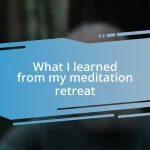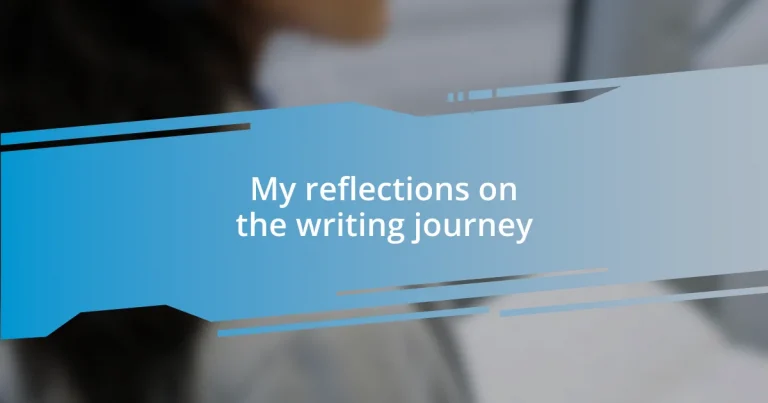Key takeaways:
- Embrace reflection as a tool for growth, cultivating resilience and clarity in your writing journey.
- Identify key milestones, such as completing your first draft and receiving feedback, as essential learning experiences that shape your skills and self-understanding.
- Celebrate both small and significant achievements to maintain motivation and deepen your connection to the writing process.
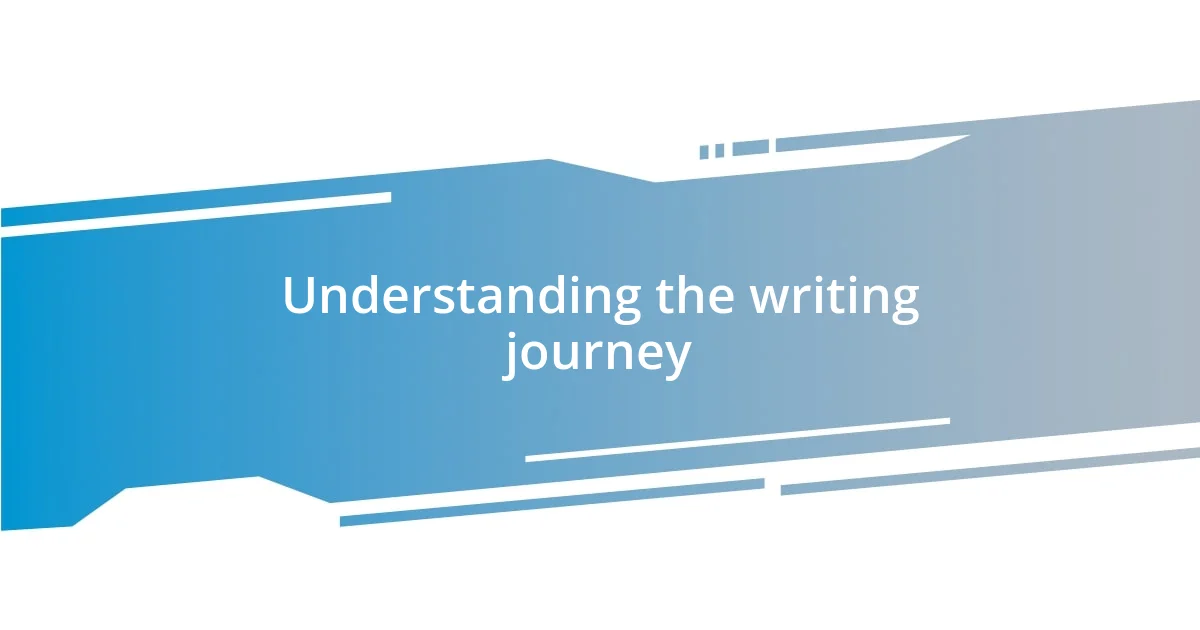
Understanding the writing journey
Understanding the writing journey can be both exhilarating and daunting. I remember my first attempt at writing—a ramshackle story about a dragon that got far too convoluted. I had so many ideas swirling in my head that I felt like I was trying to catch smoke. That chaos felt overwhelming, but it also sparked a deep passion for storytelling that has driven me ever since.
As I navigated through countless drafts, each piece felt like a stepping stone on a long path. Have you ever noticed how each rejection letter teaches you more than any validation? I still hold onto those letters, not as reminders of failure, but as symbols of growth. Each critique pushed me to refine my voice and find the courage to be vulnerable with my writing.
The journey is not just about the end product; it’s about understanding oneself in the process. I recall a particularly tough week where I struggled with writer’s block and doubted my abilities. But in that silence, I learned something valuable: sometimes, the best ideas come after embracing the stillness. It’s this ebb and flow of creativity that shapes our voice and narrative style.
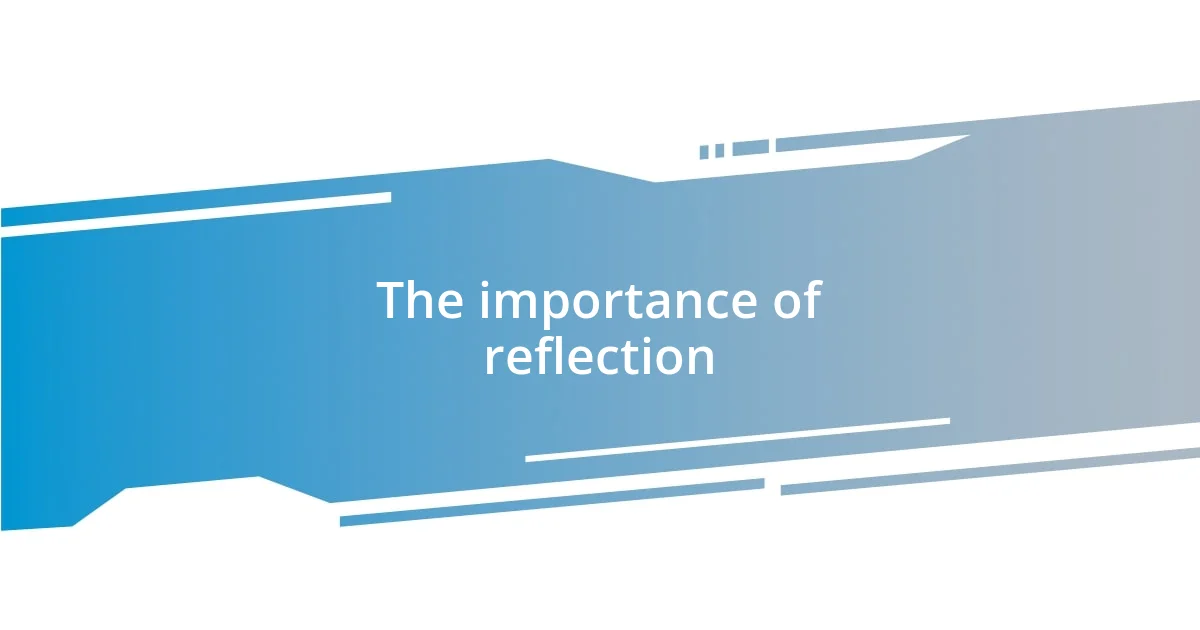
The importance of reflection
Reflecting on my writing journey has been transformative. Each piece I’ve produced holds lessons that only time can uncover. I vividly recall an instance when I revisited an old story of mine. It was a struggle to read through my earlier work; I could hardly believe the mistakes I made. Yet, it reminded me of how far I’ve come, and it was a powerful affirmation that growth is not linear.
The process of reflection allows me to connect the dots between my experiences and my evolution as a writer. I’ve sometimes found it hard to embrace criticism, viewing it as a setback rather than a stepping stone. One day, after a particularly harsh review, I took a moment to sit with my thoughts. It was a wake-up call; instead of wallowing in disappointment, I chose to analyze the feedback. That moment sparked a greater self-awareness that propelled me to focus on my strengths.
Reflection, in my opinion, is not just a tool; it’s a necessity for progress. It encourages us to cultivate resilience, nurturing our creative spirits through the inevitable highs and lows. I can think of many occasions where taking time to reflect on my processes led to those unexpected moments of clarity that renewed my passion for writing. Ultimately, it’s a rewarding practice that shapes not just our work but our identity as writers.
| Aspect | Description |
|---|---|
| Growth | Reflection highlights areas for improvement, allowing for personal and skill development. |
| Self-awareness | It encourages us to understand our strengths and weaknesses better. |
| Resilience | Reflection helps cultivate resilience amid the challenges and criticism in writing. |
| Clarity | Taking time to reflect can lead to moments of clarity and inspiration for future projects. |
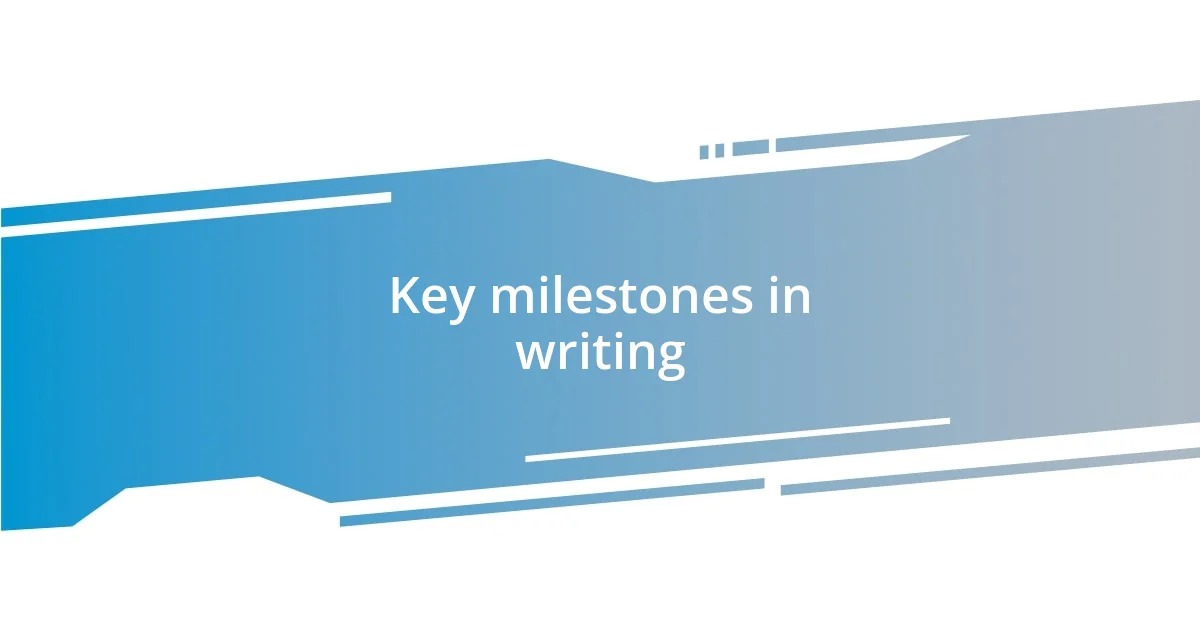
Key milestones in writing
The key milestones in my writing journey often feel like small victories, building upon a foundation of persistence and creativity. Each finished piece represents not just an end but a learning experience. I distinctly remember the first time someone asked to read my work outside of my comfort zone. The sheer thrill mixed with anxiety taught me a lot about vulnerability in sharing my thoughts. It propelled me to embrace criticism and helped me understand that each response, whether positive or negative, plays a crucial role in enhancing my craft.
Here are some key milestones that stand out in my writing path:
- First Draft Completed: I felt an exhilarating rush, marking a significant accomplishment in my writing process.
- First Feedback Received: This moment was pivotal; it taught me to differentiate between my voice and outside perspectives.
- Publication of First Article: Holding that print version in my hands felt surreal, validating all my efforts.
- Completion of a Major Project: Overcoming self-doubt during this phase was a major personal triumph.
- Establishing a Writing Routine: This milestone fostered consistency, helping me develop discipline and focus in my writing endeavors.
Each of these moments not only shaped my writing skills but also deepened my understanding of myself as a creator. I still cherish the journey and the lessons learned—after all, it’s not just about getting published; it’s about embracing every step along the way.
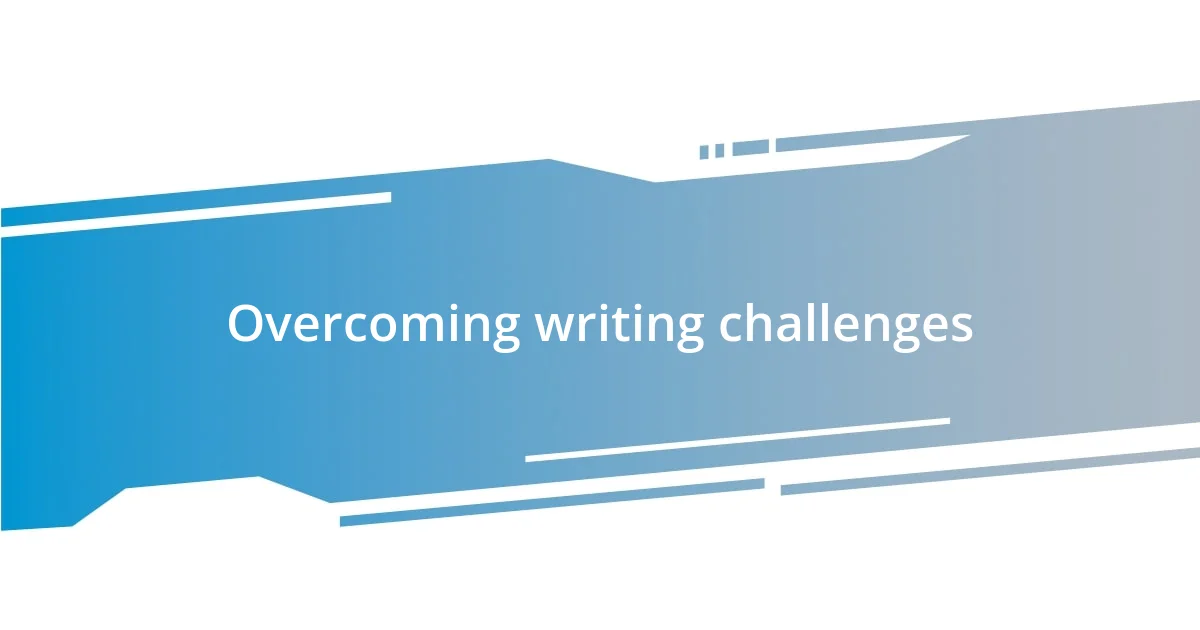
Overcoming writing challenges
Overcoming writing challenges has always felt like climbing a mountain for me. I remember grappling with the infamous writer’s block during a particularly critical project. It seemed insurmountable. I had pages due, but the words just wouldn’t flow. I found myself pacing around my room, feeling the weight of uncertainty. Eventually, I forced myself to write anything—even if it was just a sentence about how stuck I felt. Surprisingly, that little nudge opened the floodgates. Isn’t it fascinating how giving ourselves permission to be imperfect can lead to breakthroughs?
Another significant challenge for me has been the fear of inadequacy, especially after submitting my work for the first time. The anticipation of feedback was nerve-wracking. I wondered if my writing would truly resonate or if it would fall flat. Upon receiving critiques, initially, I felt disheartened. However, I soon realized each piece of feedback was a pathway to deeper understanding and refinement. For instance, one reviewer highlighted my tendency to overwrite. That comment nudged me to strive for clarity, making each word count. Have you ever had a review that felt like a gentle kick in the right direction?
Lastly, I often wrestle with the temptation to compare my journey to those of others. Social media can amplify this; scrolling through the successes of peers sometimes feels daunting. However, I’ve learned to shift my focus. Instead of viewing others’ achievements as yardsticks for my progress, I celebrate their successes as inspirations for my growth. A close friend once reminded me that everyone has a unique path, and it’s essential to honor my journey, with all its ups and downs. Does that resonate with you? It has certainly helped me cultivate a more positive mindset in my writing life.

Finding your writing voice
Finding your writing voice is a journey filled with self-discovery and reflection. Early on, I struggled to identify what truly set my writing apart. I remember staring blankly at a page, feeling the pressure to sound sophisticated or trendy. It wasn’t until a mentor suggested I write as if I were having a conversation with a friend that everything clicked. Suddenly, my words flowed more naturally, and I felt like I was in my element. Isn’t it amazing how a simple shift in perspective can unlock our true potential?
As I continued to explore my voice, I often revisited old pieces. It was eye-opening. I marveled at how my style had evolved. In fact, I once stumbled across a poem I’d written in college. The lines felt stilted and forced, yet they represented who I was back then. This realization made me appreciate the growth I’ve experienced over the years. Isn’t it comforting to know that our voices can evolve as we do? Embracing change rather than resisting it has become a cornerstone of my writing philosophy.
Today, I find inspiration in my everyday experiences, distilling them into words that resonate with authenticity. I often ask myself, “What am I truly passionate about?” When I write from that well of genuine emotion, my voice becomes stronger and more distinct. For instance, after a meaningful conversation with a friend about our fears, I penned an article that encapsulated that vulnerability. Seeing how it resonated with others reaffirmed that finding my voice isn’t about perfection; it’s about honesty and connection. Have you found those moments where your writing unexpectedly struck a chord with someone? Those moments are gold in the writing journey.
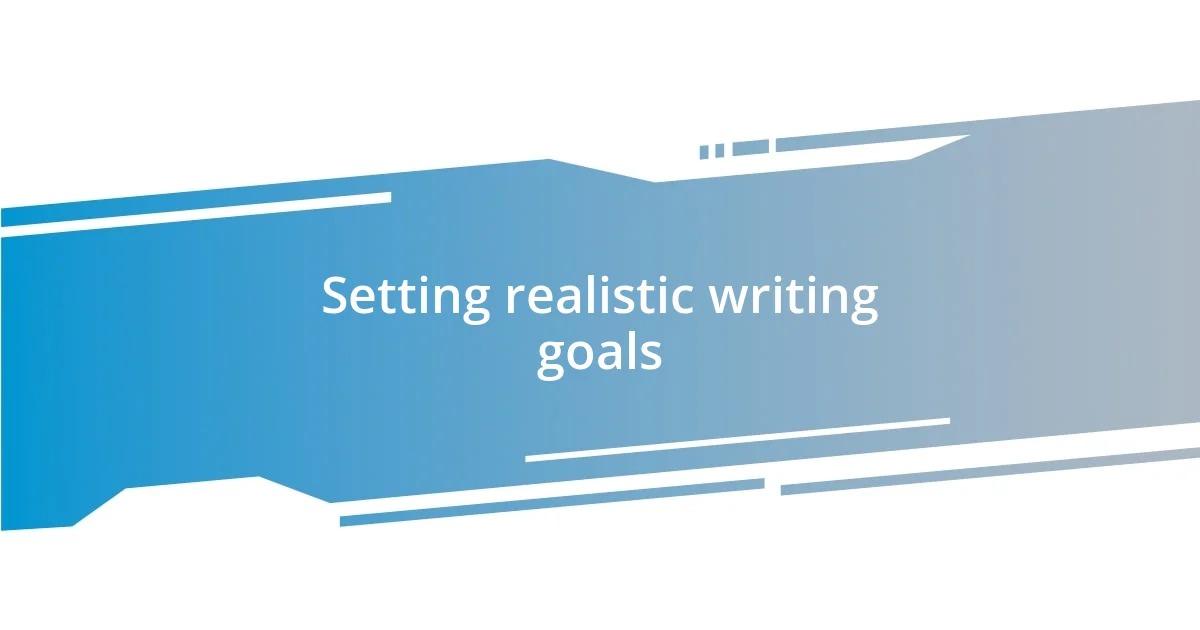
Setting realistic writing goals
Setting realistic writing goals is an essential part of any writer’s journey. I remember when I first started, my goals were ambitious but often felt overwhelming. Writing every day for hours? Sure, in theory! But in reality, between work and life, I found that aiming for even a single page was more manageable. It taught me that setting small, achievable targets not only built my confidence but also kept the passion for writing alive.
As I continued to refine my approach, I learned the importance of evaluating my progress regularly. I’ve found it helpful to revisit my goals weekly. For example, I’ll ask myself if the target I set was reasonable and if I stuck to my writing schedule. This habit allows me to adjust my goals based on how I’m feeling creatively or even what’s happening in my life. It’s a gentle reminder that writing is a marathon, not a sprint.
Another trick I’ve adopted is to tie my goals to specific projects. Instead of a vague “write more,” I’ll define it as “complete the first draft of my short story by the end of the month.” This clarity turns my writing into a focus-driven task. Have you ever noticed how pinpointing your objectives can bring a sense of purpose? When the finish line is clear, there’s something so motivating about crossing it—no matter how small the goal may seem. Each small success fuels my desire to keep writing, reminding me that progress is just as important as the end result.
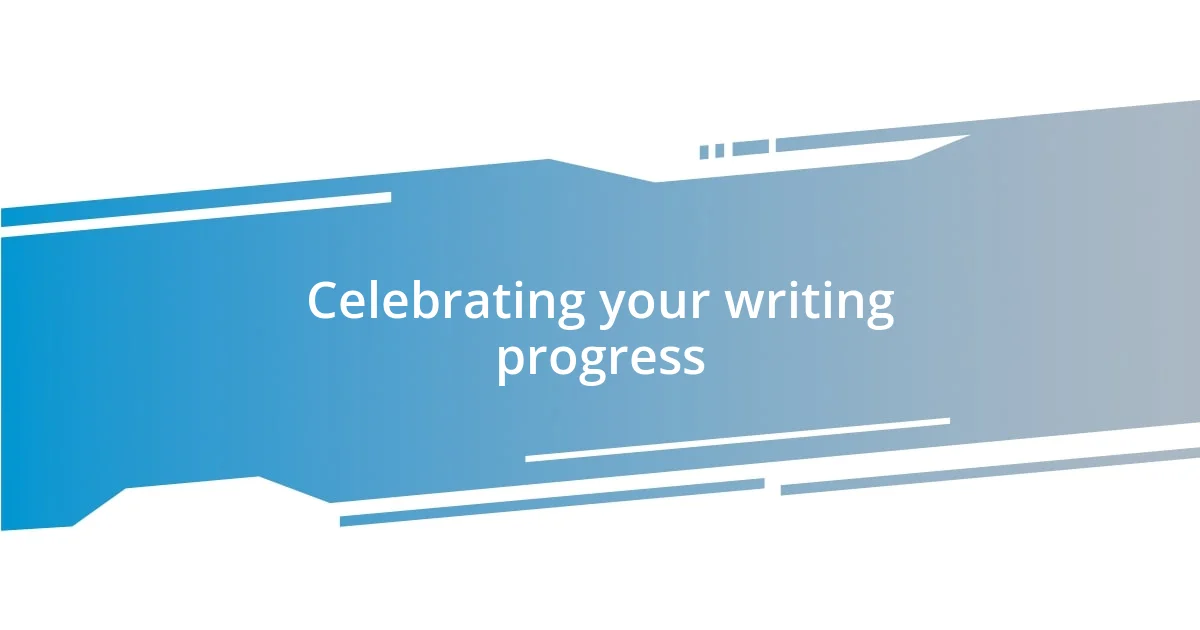
Celebrating your writing progress
Celebrating your writing progress is crucial, yet I often find that it’s so easy to overlook. There was a time when I wrote an entire chapter and didn’t stop to appreciate it. I mistakenly thought that only completed projects warranted celebration. Looking back, I realize how much I’ve missed by not acknowledging those smaller victories. Isn’t it fascinating how a simple pat on the back can reinforce our motivation to write more?
One of my favorite ways to celebrate is through journaling. After completing a significant piece, I often take a moment to write about how I felt during the process. I recall finishing my first short story; I poured a cup of tea, sat in my favorite spot, and reflected on the journey. The excitement of finishing was tangible, but writing about the struggles and triumphs made the achievement feel even more significant. Have you ever paused to jot down your thoughts after reaching a milestone? It’s a rewarding ritual that can deepen your connection to your writing journey.
Another approach I’ve found invaluable is sharing my progress with fellow writers. I remember the thrill of presenting my work at a local writer’s group. The supportive feedback and the genuine applause felt like a warm hug for my creative soul. It was less about the accolades and more about that shared understanding of the journey each of us was on. Reaching out to others reminds me that every writer, no matter their skill level, deserves to celebrate their unique path. So, how do you celebrate your writing accomplishments? In my experience, it’s these moments of joy that fuel our passion for storytelling.
